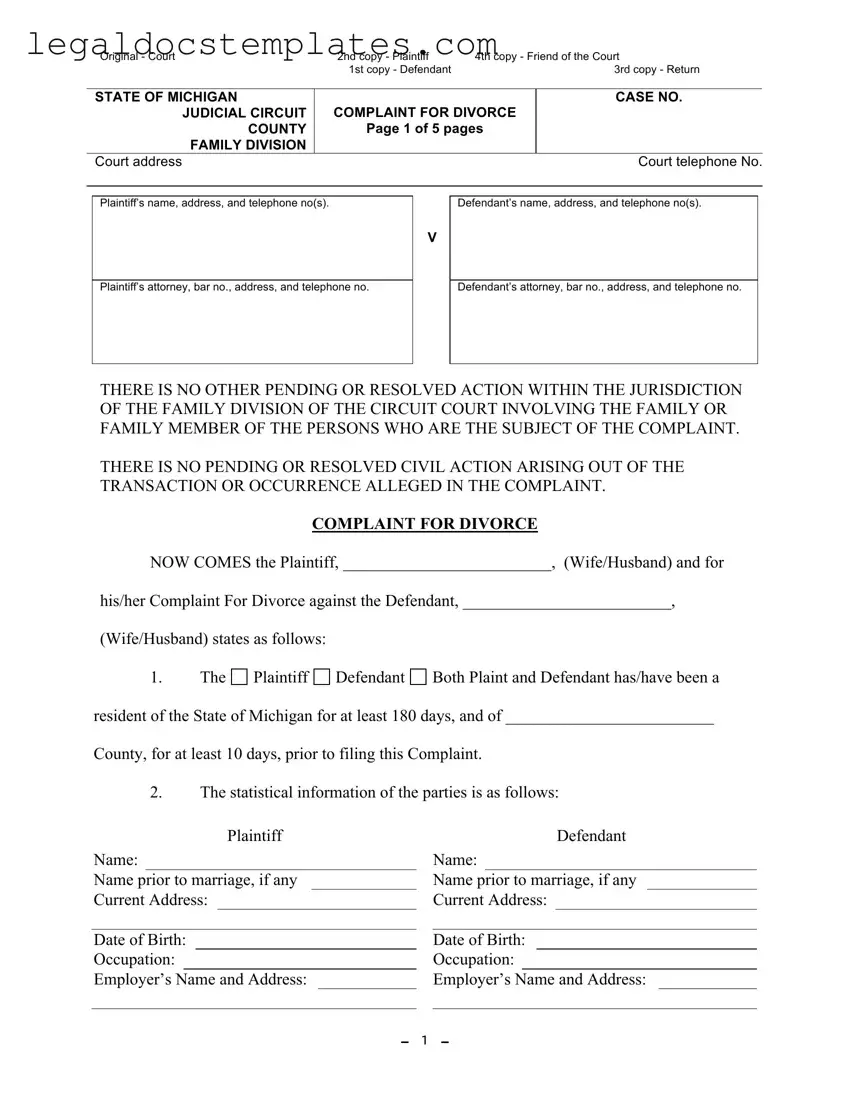The Michigan Complaint for Divorce form is a legal document that initiates the process of obtaining a divorce in the state of Michigan. It outlines basic information about both parties, the marriage, reasons for seeking a divorce, residency requirements, property, child custody, and any settlements or agreements. This form is the first step in the legal process and is filed in the family division of the circuit court in the county where one of the parties lives.
Any individual seeking to divorce their spouse in Michigan must fill out and submit the Complaint for Divorce form. This applies to the plaintiff, the person initiating the divorce. It is important for this document to be completed accurately, as it sets the stage for the divorce proceedings.
To file for divorce in Michigan, either the plaintiff or the defendant must have been a resident of the state for at least 180 days before filing. In addition, they must have lived in the county where the complaint is filed for at least 10 days prior to filing. These residency requirements ensure that Michigan courts have jurisdiction over the divorce.
The form requires detailed information about any minor children from the marriage, including their names, dates of birth, social security numbers, current living arrangements, and a history of their residency for the past five years. It also includes questions regarding past or ongoing custody proceedings involving the children, which help the court make informed decisions regarding custody and support.
-
Name
-
Date of Birth
-
Social Security Number
-
Current Residence
-
Residency for the past five years
-
Participation in custody proceedings
How does property division work in a Michigan divorce?
The form mentions that the parties might own property together or separately that needs to be divided. Michigan follows the principle of equitable distribution, which means the court divides property in a way it deems fair, not necessarily equally. Parties are encouraged to reach a Property Settlement Agreement on their own terms, and if they do, that agreement must be included and will be reviewed by the court for fairness.
Yes, the form requires the plaintiff to state that there has been a breakdown in the marriage relationship to the extent that the objects of matrimony have been destroyed, and there remains no reasonable likelihood that the marriage can be preserved. Unlike some states, Michigan does not require you to prove fault to obtain a divorce.
Yes, the form allows for the restoration of a spouse's name to their maiden name or a previously held surname. This request can be made as part of the divorce petition, and if granted, the divorce decree will officially restore the spouse's name.
What are the next steps after filing the Complaint for Divorce?
After the Complaint for Divorce is filed, it must be formally served on the other spouse, marking the beginning of the divorce proceedings. The spouse has the opportunity to respond, and the court will schedule hearings to address issues related to property, children, and any other disputes. The process may involve negotiation, mediation, or trial to resolve these issues before a divorce is granted.



 Plaintiff
Plaintiff  Defendant
Defendant  Both Plaint and Defendant has/have been a resident of the State of Michigan for at least 180 days, and of _________________________
Both Plaint and Defendant has/have been a resident of the State of Michigan for at least 180 days, and of _________________________
 have
have  do not have property to be divided.
do not have property to be divided. have
have  have not participated as a party or witness or in another capacity, in another child custody proceeding concerning the children.
have not participated as a party or witness or in another capacity, in another child custody proceeding concerning the children. know
know  do not know of a proceeding that could affect the current child custody proceeding, including a proceeding for enforcement or a
do not know of a proceeding that could affect the current child custody proceeding, including a proceeding for enforcement or a
 know
know  do not know of any person who is not a party to this child custody proceeding and has physical custody of the children or claims rights of legal custody or physical custody of , or parenting time with, the children.
do not know of any person who is not a party to this child custody proceeding and has physical custody of the children or claims rights of legal custody or physical custody of , or parenting time with, the children.


